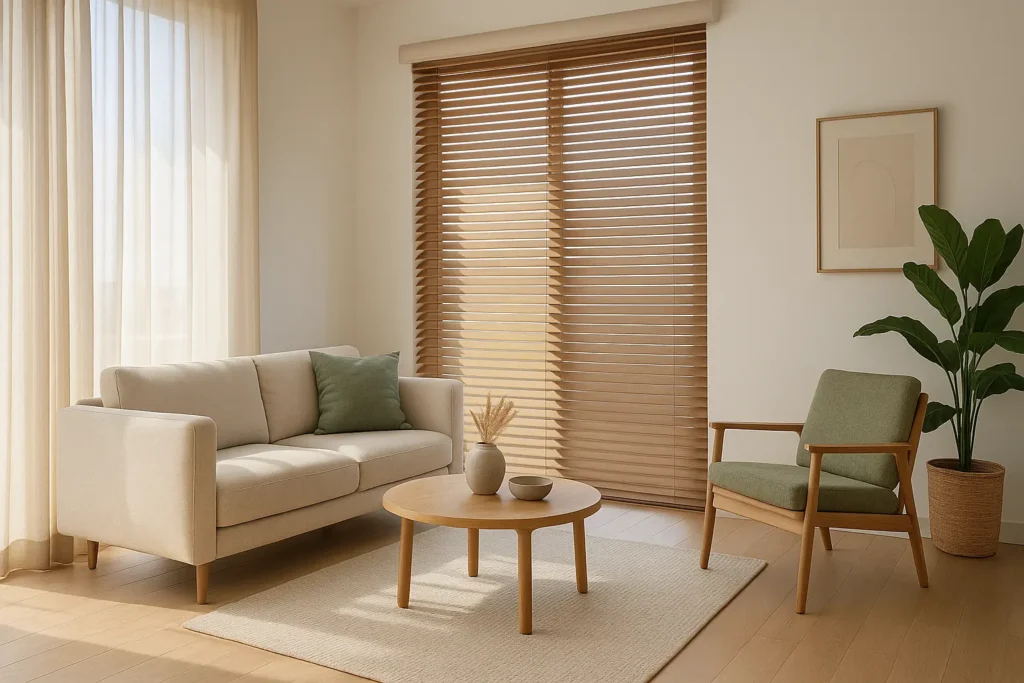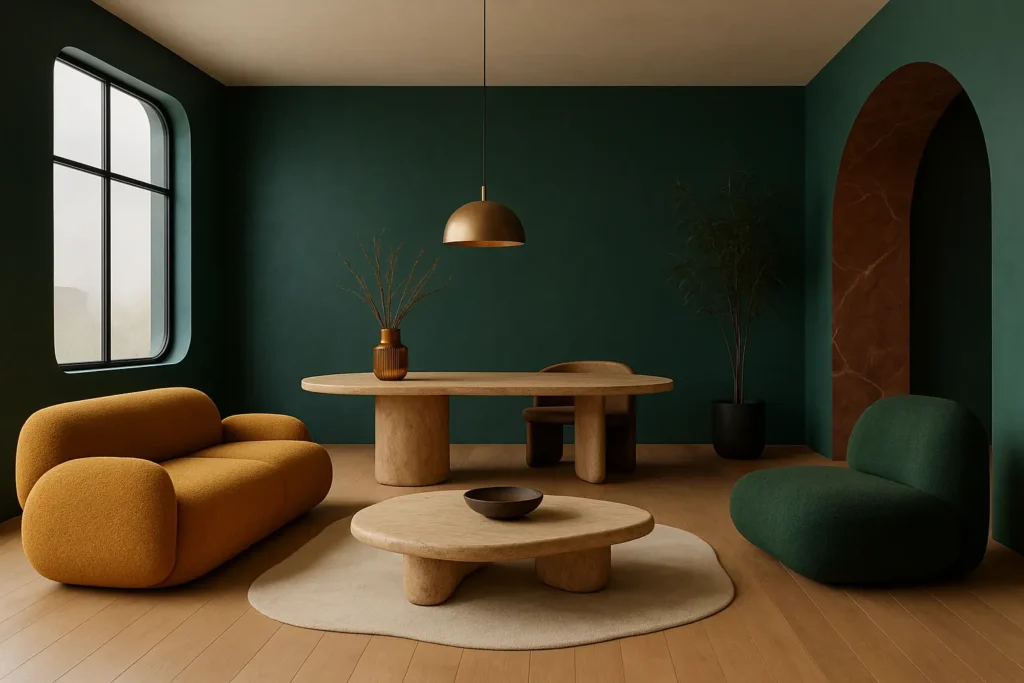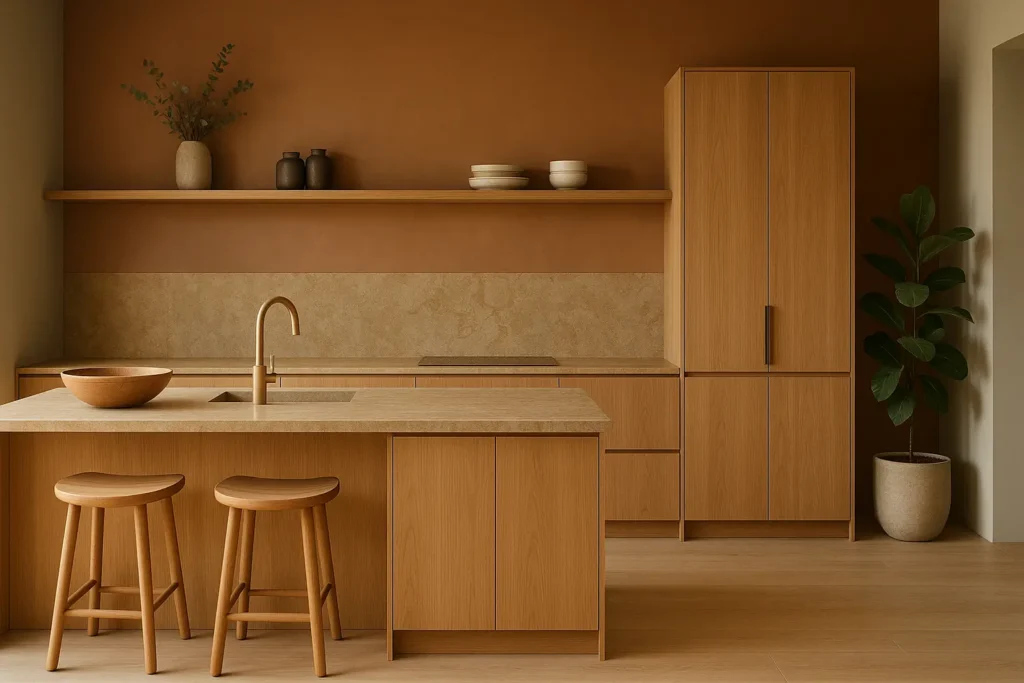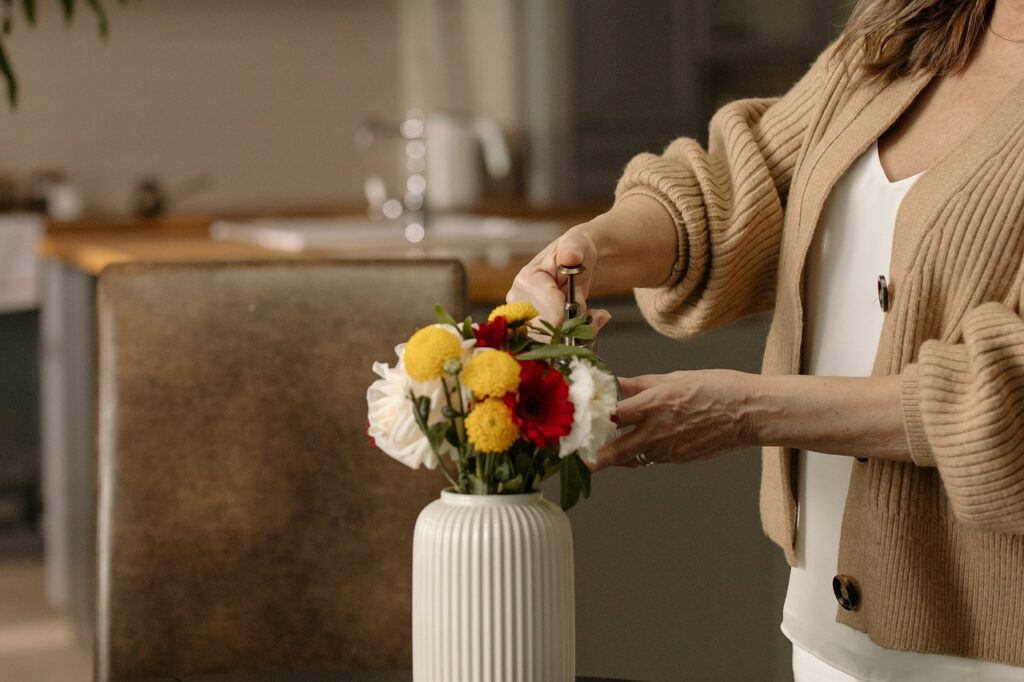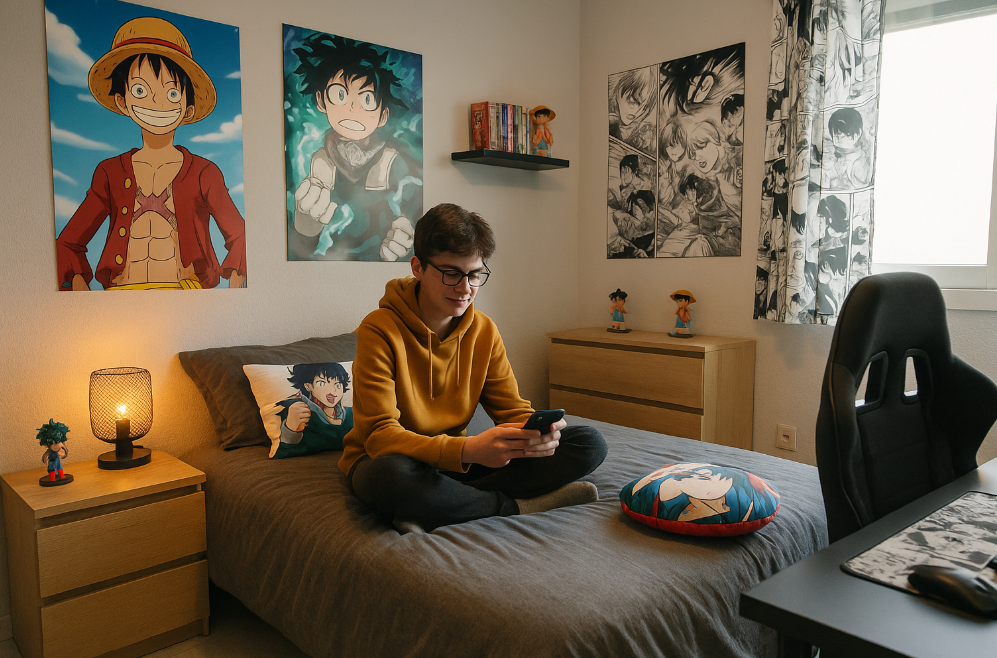Feng Shui, this 3,000-year-old ancestral Chinese art, is much more than a simple decorative approach. Its name, meaning "wind and water," already reveals its philosophy: creating a harmonious flow between the elements to generate positive energy in our homes. By transforming our living spaces according to these age-old principles, we invite well-being, serenity, and even prosperity to settle in our homes permanently. Discover how to transform your interior thanks to this subtle art of harmonizing energies, for a home that exudes balance and serenity.
Our article in brief:
THE Feng Shui, a 3000-year-old ancestral Chinese art, harmonizes energies to transform your interior into a haven of well-being.
- The Chi, vital energy, must circulate freely in a space cleared of all clutter.
- The balance Yin-Yang creates perfect harmony: calm in the bedroom, dynamism in the office.
- THE five elements (wood, fire, earth, metal, water) are integrated through colors, materials and shapes.
- THE Bagua divides your space into eight energy zones corresponding to aspects of your life.
- A Feng Shui interior brings serenity, better sleep and harmonious relationships.
In this article
The fundamental principles of Feng Shui for a harmonious interior
At the heart of Feng Shui philosophy is the essential concept of Chi, this vital energy that circulates everywhere. To create a truly harmonious interior, we must first understand how to promote the optimal flow of this positive energy throughout our spaces. A cluttered interior inevitably blocks this vital circulation, creating areas of stagnant energy that are not conducive to well-being.
The balance between the Yin and Yang constitutes another crucial foundation. These complementary forces must coexist harmoniously in each room. Yin, feminine element associated with calm and passivity, balances perfectly with Yang, masculine principle embodying dynamism and activityIn a bedroom, for example, focus more on Yin to promote rest, while an office will benefit from more pronounced Yang energy.
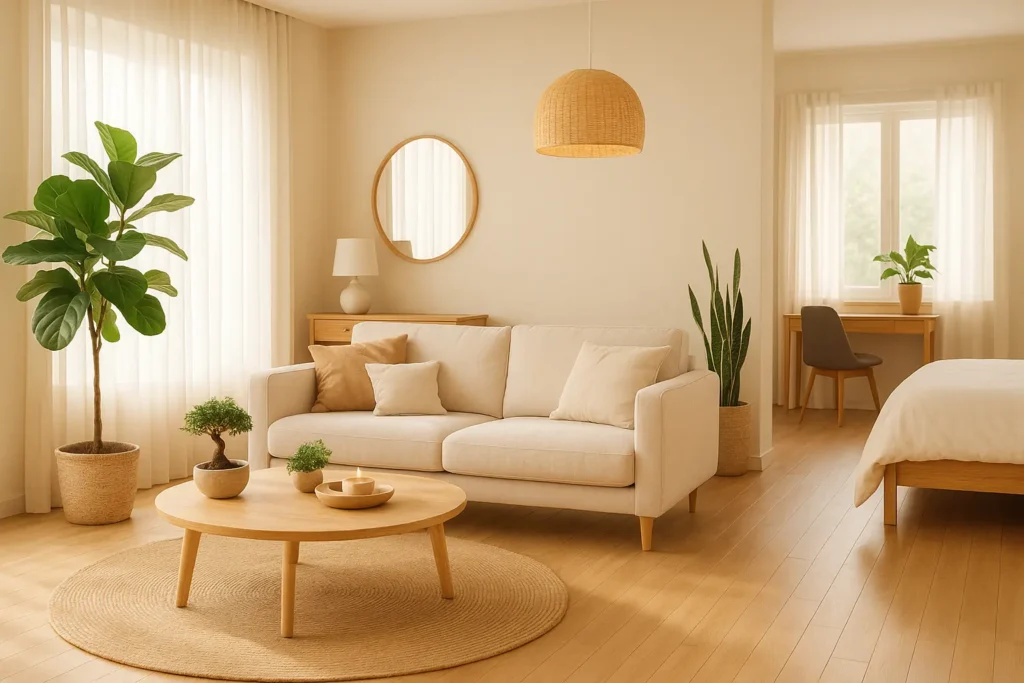
The five fundamental elements (wood, fire, earth, metal, and water) together form a cycle of harmony that should be subtly integrated into your decor. Each element can be expressed through specific colors, materials, or shapes. Wood is expressed through plants and natural furniture, while water is found in mirrors or indoor fountains.
The Bagua, a true energy map of your space, divides your home into eight zones, each corresponding to a specific aspect of your life: career, wisdom, family, prosperity, reputation, love, creativity, and travel. By identifying these zones in your home, you can target your decorative interventions to stimulate the specific aspects you wish to develop.
The benefits of Feng Shui design
An interior harmonized according to the principles of Feng Shui profoundly transforms your daily life. The fluid circulation of Chi creates an atmosphere where stress dissipates naturally, promoting restful sleep and deep relaxation. Clear and balanced spaces also stimulate creativity and mental clarity, facilitating decision-making.
On a relational level, harmonizing energies promotes more peaceful interactions between the occupants of the home. Tensions decrease while communication improves significantly. Many practitioners even report an improvement in their financial situation after reorganizing their space according to these ancestral principles, particularly by activating the southeast zone associated with prosperity.
What Feng Shui layout and decoration per room?
The living room according to the principles of Feng Shui
The living room, a space for conviviality par excellence, deserves special attention in Feng Shui design. Position your sofa against a solid wall to create a feeling of security and stability. Absolutely avoid placing it with its back to the front door, a position considered vulnerable in Chinese tradition. In a Feg Shui living room, favor a circular arrangement of armchairs to facilitate exchanges and the circulation of energy.
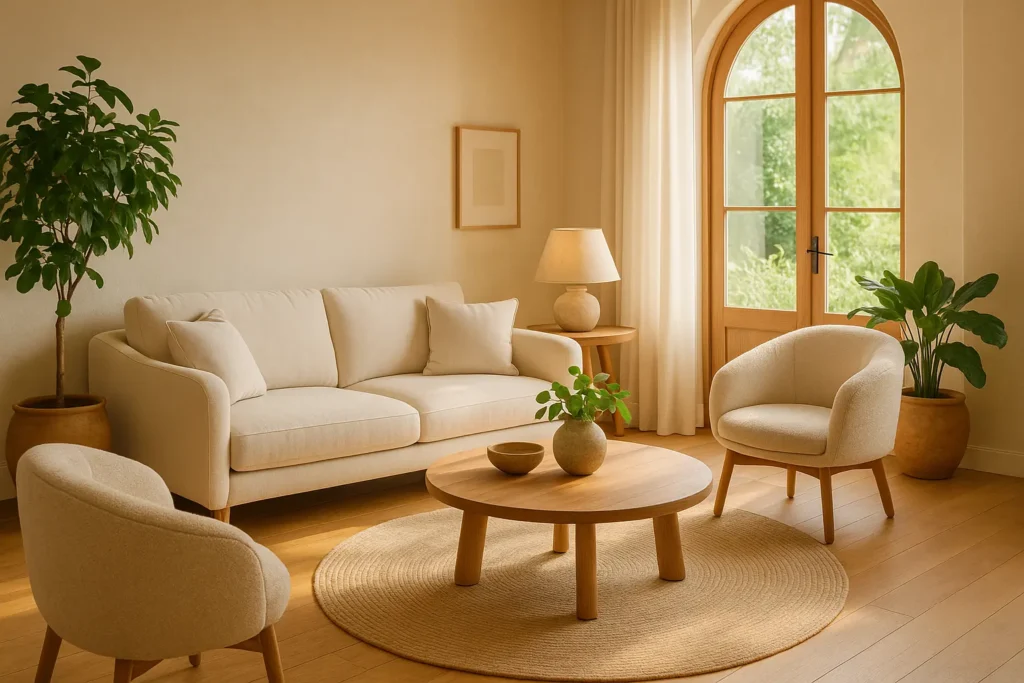
The rounded shapes soften the atmosphere and allow the Chi to flow harmoniously, avoiding harsh angles that create Shar Chi (negative energy). Multiply the light sources to create varied atmospheres depending on the time of day. Natural materials such as wood and plant fibers bring warmth and connection to nature, reinforcing the overall harmony of this central space.
The bedroom, a Feng Shui sanctuary of rest
The bedroom represents your personal sanctuary, where energy should promote rest and regeneration. The placement of the bed is crucial: place it against a solid wall, never under a window where energy constantly fluctuates. Also, avoid aligning it directly with the door, a position called the "dead man's position" in traditional Feng Shui.
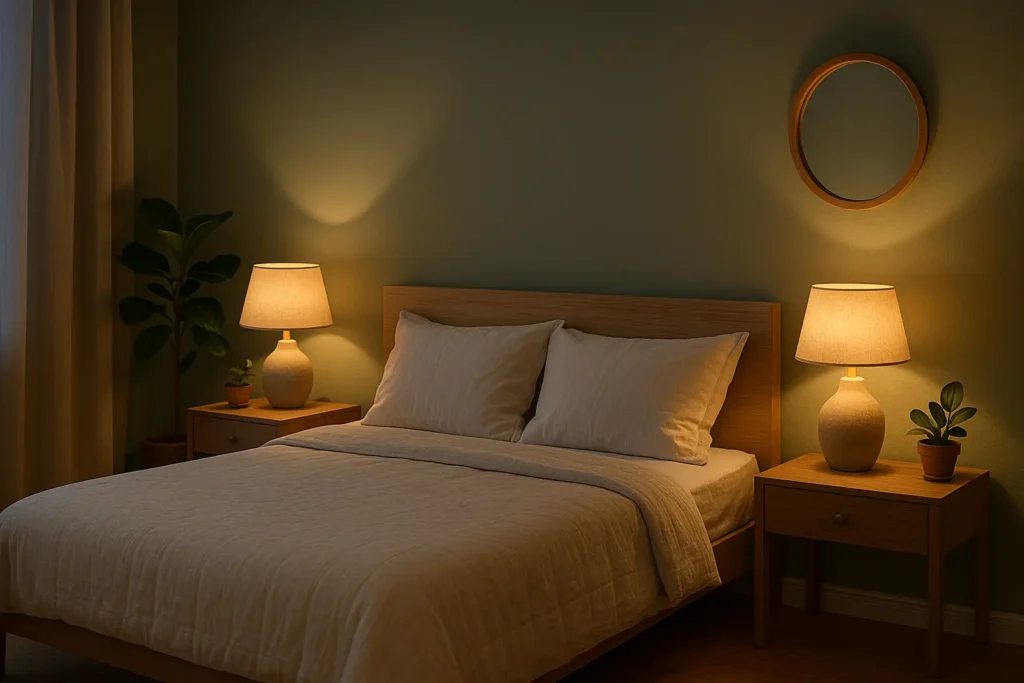
Ban all electronic devices that emit waves that disrupt sleep. In a Feng Shui bedroom, mirrors, especially facing the bed, are not recommended because they reflect and amplify energy, creating agitation that is not conducive to rest. Opt for natural textiles such as linen or cotton for your bedding, and choose soft lighting, ideally dimmable, to gradually prepare your body for sleep.
Feng Shui cooking
The kitchen, associated with food and prosperity in Feng Shui, particularly benefits from thoughtful design. In a Feng Shui kitchen, position your work surface so that you never have your back to the entrance of the room while preparing meals. This position, known as the "command position," allows you to maintain control over your environment.
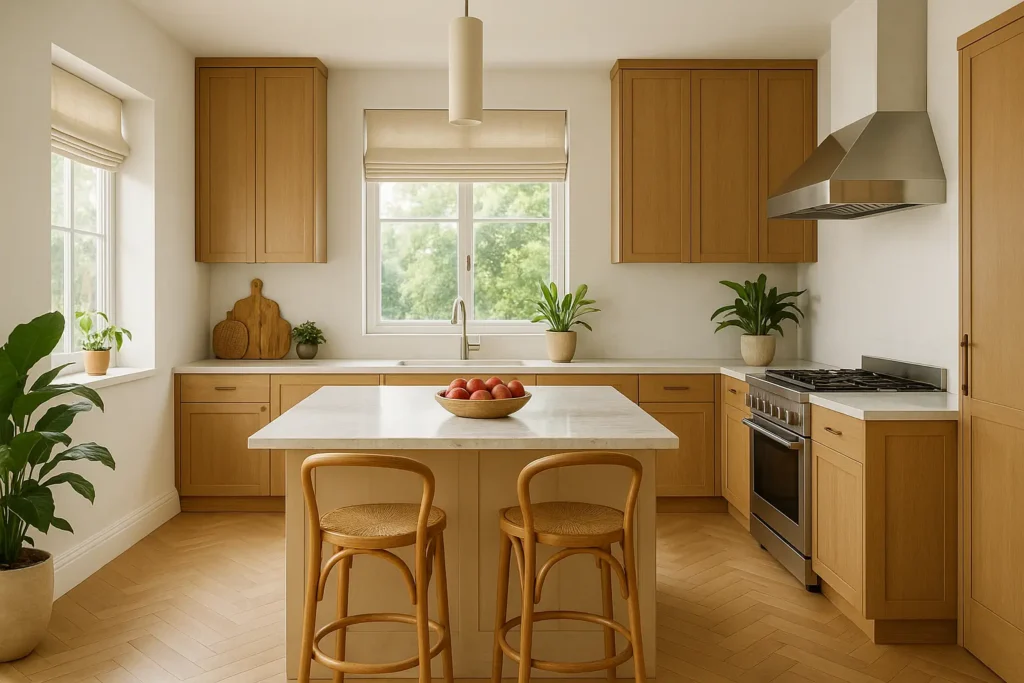
The Feng Shui bathroom
In the Feng Shui bathroom, the water element naturally predominates. To maintain balance, introduce earth and wood elements in the form of green plants, which, in addition to absorbing excess moisture, purify the air. Ensure optimal ventilation to avoid energy stagnation and favor rounded shapes for sinks and bathtubs, which soften the energy of this space.
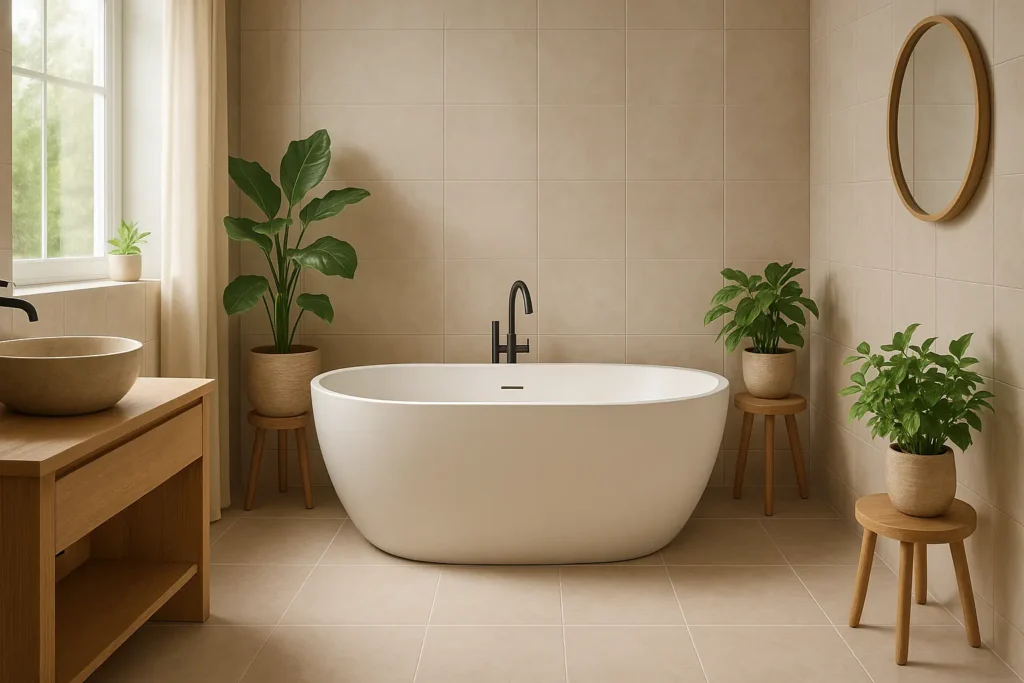
Feng Shui Entrance and Office
The entryway represents the welcoming door for all the energies that enter your home. A thorough decluttering is essential in this often-neglected space. Install a mirror to amplify the light and symbolically double the opportunities that present themselves to you. Welcoming yet understated colors like beige or pastel shades invite positive energy to enter.
For your desk, create a space that encourages concentration while maintaining calm. Position your desk in a "command position," with your back to the wall and facing the door, but not directly in line with it. Green plants and natural light stimulate creativity while an efficient storage system prevents the accumulation of Shar Chi related to clutter.
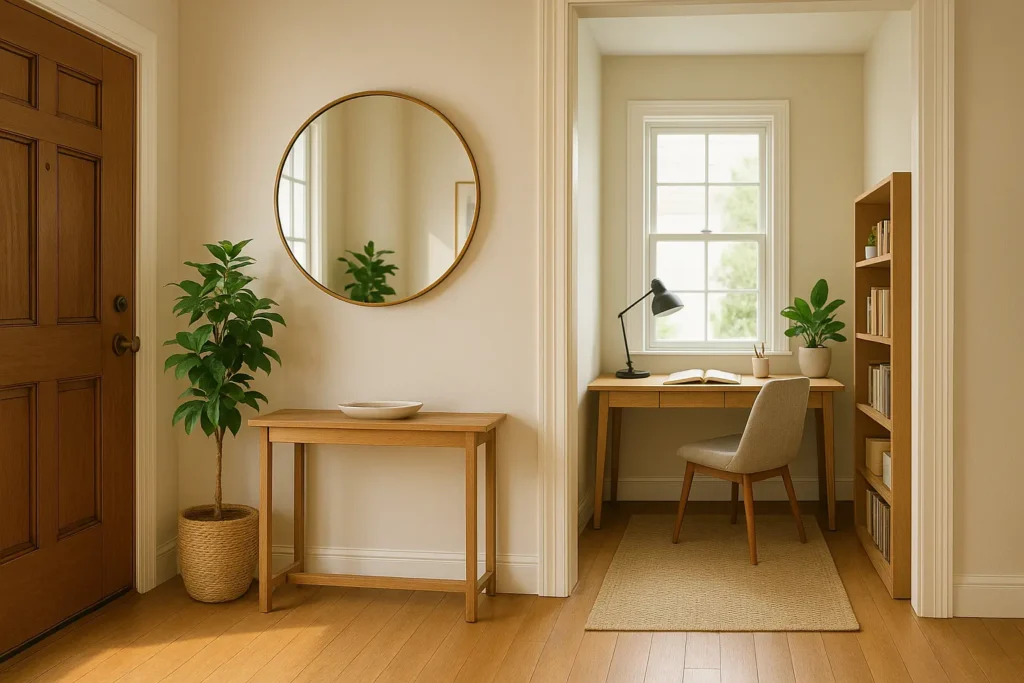
Feng Shui Colors: Creating Harmony Through the Color Palette
Symbolism of colors in Feng Shui tradition
In Feng Shui philosophy, each color carries a specific energy and profoundly influences our well-being. Red, intensely Yang, stimulates vitality and is ideal for communal spaces like the dining room. Yellow, associated with the earth element, brings warmth and optimism, ideal for a kitchen or entrance hall. As for blue, it evokes water and promotes calm and introspection, perfect for a bedroom or meditation space.
| Bagua area | Element | Recommended colors | Energy impact |
|---|---|---|---|
| North (Quarry) | Water | Dark blue, black | Professional development, fluidity |
| Southeast (Wealth) | Drink | Green, purple | Prosperity, abundance |
| East (Family) | Drink | Green, blue-green | Health, family growth |
| South (Reputation) | Fire | Red, orange | Recognition, visibility |
| Southwest (Love) | Earth | Pink, white | Harmonious relationships, support |
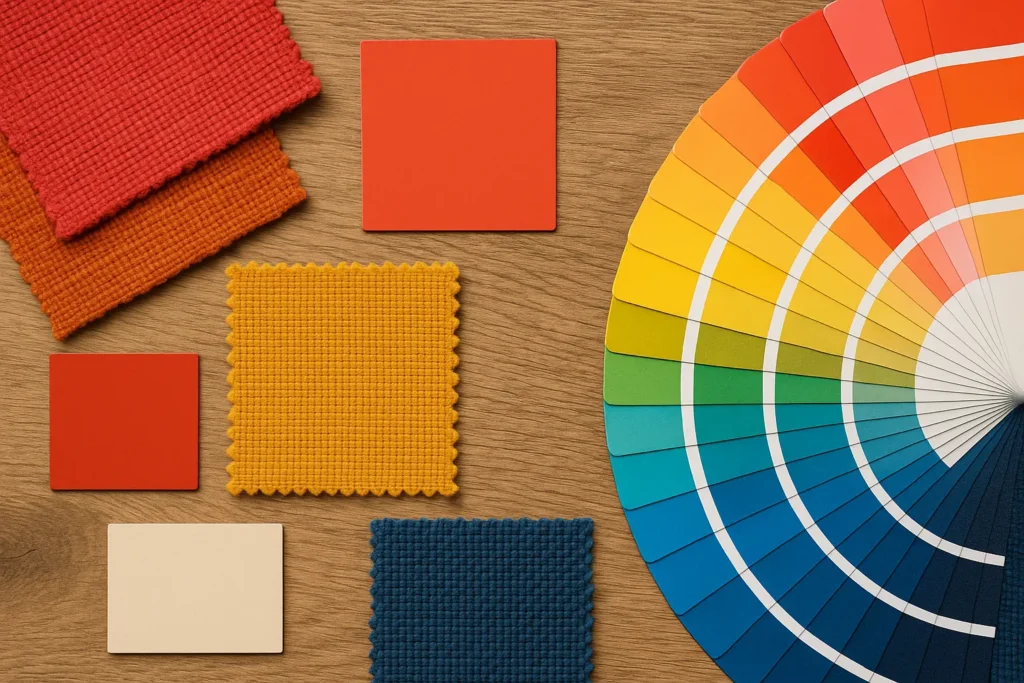
Application per piece according to chromatic principles
To apply this palette wisely, adapt it to the function of each space. In a south-facing living room, touches of red will stimulate the naturally present fire energy, while a northeast-facing bedroom will benefit from soft hues like beige or pale yellow to balance the earth energy. The balance between bright and soft hues creates visual harmony essential to well-being.
Avoid harsh contrasts that fragment energy and favor smooth transitions between rooms. For a small space, light shades visually amplify the volume while promoting the flow of chi. Conversely, in a very large room, a few dark accents create a sense of grounding and security.
Materials and accessories for successful Feng Shui decoration
Natural materials in the service of harmony
The choice of materials directly influences the energy quality of your home. Wood, representing growth and vitality, brings warmth and character in the form of furniture, parquet floors, and decorative objects. Stone and ceramic, rooted in the earth element, generate stability and security, perfect for countertops or tiles.
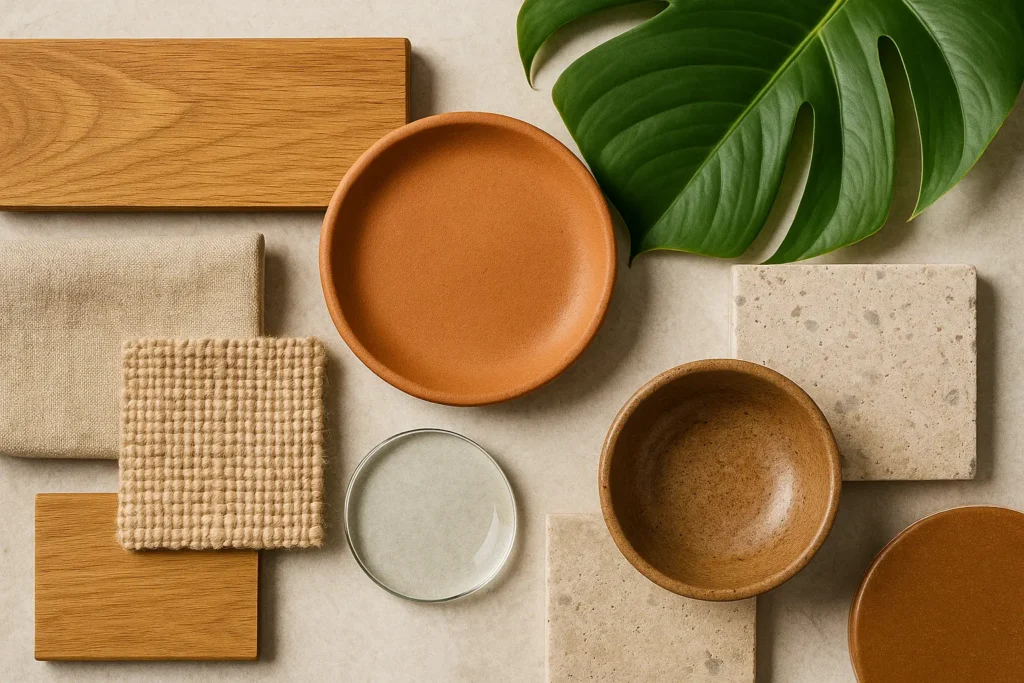
Natural textiles like linen, wool or cotton promote healthy breathing in your home, avoiding the accumulation of static energy often associated with synthetic materials. Glass and mirrors, linked to the water element, amplify light and create a sense of space, particularly beneficial in small or dark rooms.
Essential Feng Shui Accessories
- Indoor plants : True air purifiers, they symbolize growth and vitalize spaces. Choose those with rounded leaves that soften energy, such as pothos or ficus lyrata.
- Indoor fountains : their soothing murmur creates a serene atmosphere while activating prosperity energy in the southeast area of your home.
- Strategically placed mirrors : they reflect and amplify positive energy, particularly effective when facing a beautiful view or to visually widen a narrow corridor.
- The chimes : hung near windows or doors, they disperse the Shar Chi and announce the arrival of new opportunities.
- Significant personal items : photos of happy moments or travel memories nourish the soul of the home and create a unique energetic signature.
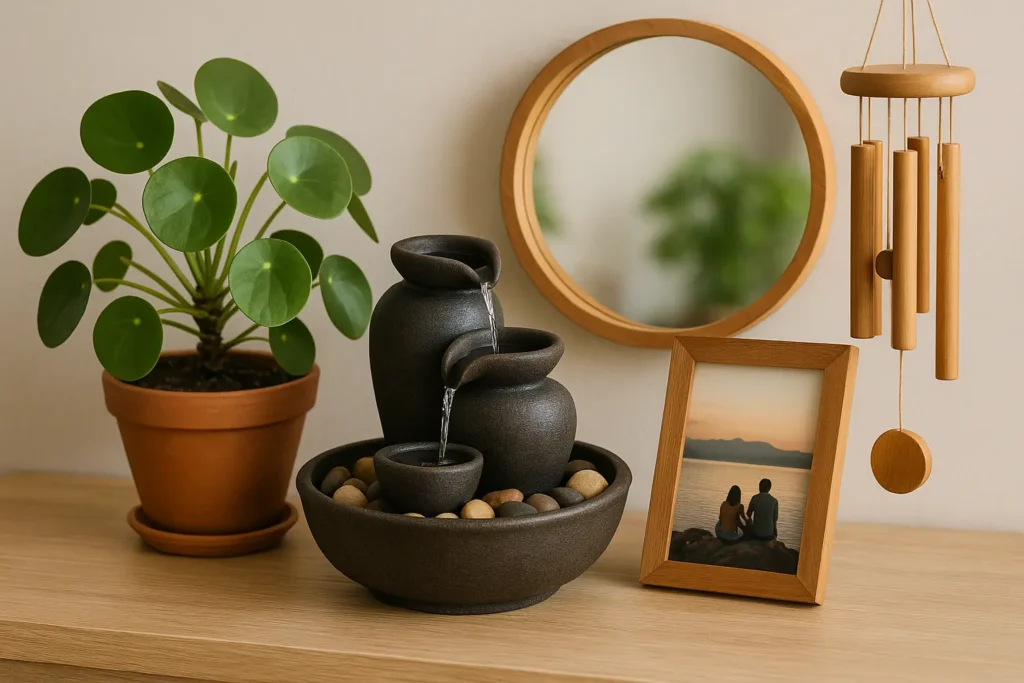
Avoiding Common Feng Shui Decorating Mistakes
Planning errors to be corrected
Certain configurations create persistent energy blockages in our homes. Among the most problematic is placing a bed under a window, a position that weakens energy during sleep. Also avoid setting up a desk with its back to the door, which unconsciously creates a feeling of insecurity that is not conducive to concentration.
Cluttered hallways are real blockers to the flow of Chi. Clear these transition spaces to allow energy to flow freely throughout the room. House. Exposed beams above the rest areas create energy pressure unfavorable. Reduce their impact with a canopy or light fabrics.
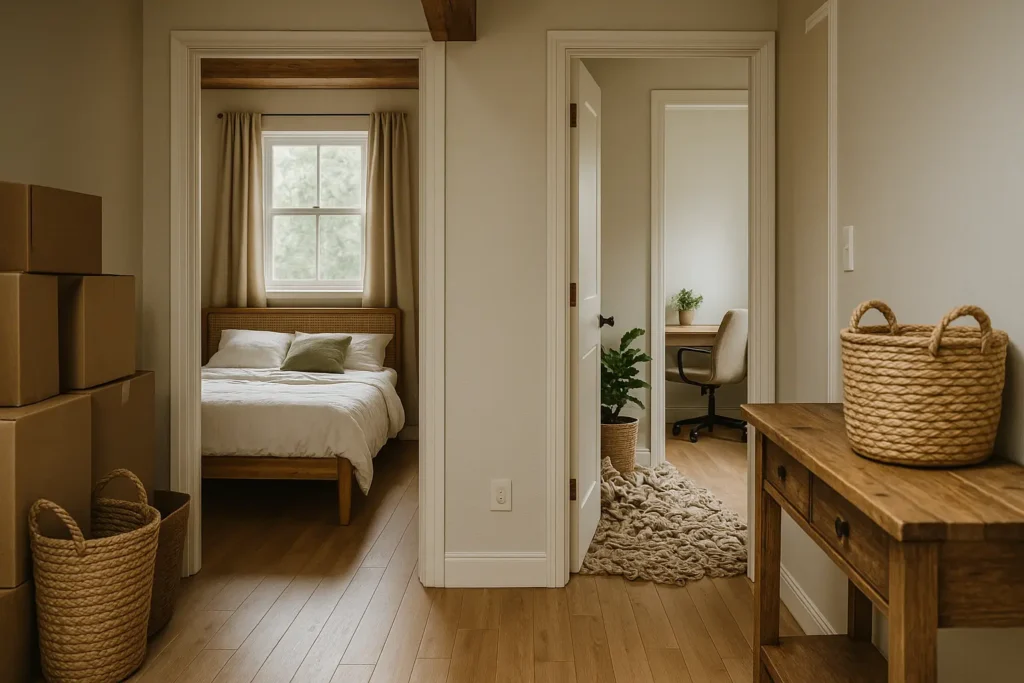
Energy Imbalances and Solutions
An excess of Yang in a bedroom, caused by overly bright colors or an overabundance of electronic devices, disrupts sleep. Balance it with Yin elements: soft textiles, subdued lighting, and pastel tones. Conversely, a living room that's too Yin will lack dynamism; revitalize it with touches of warm colors and good lighting.
For homes with unfavorable structural configurations, such as a front door directly aligned with a back door (which allows prosperity to "leak out"), corrective solutions exist. A strategically placed screen, console table, or low piece of furniture can redirect energy and neutralize this imbalance. Perfect harmony doesn't necessarily require a radical transformation, but rather subtle, thoughtful adjustments that respect the very essence of Feng Shui: creating an energy flow conducive to well-being and fulfillment.

